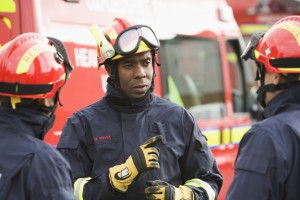 Fred is a 40-year-old firefighter who has been working as a first responder for more than 15 years. In his first year as a firefighter, he arrived at a car accident in which three children were killed. Since then, he has been among the first to respond to the scenes of countless injuries and dozens of deaths.
Fred is a 40-year-old firefighter who has been working as a first responder for more than 15 years. In his first year as a firefighter, he arrived at a car accident in which three children were killed. Since then, he has been among the first to respond to the scenes of countless injuries and dozens of deaths.
Although he tries not to think about the fatalities, he remembers each one. When asked how he and his colleagues cope with the trauma of witnessing such horrific events, he looks away, chuckles, and says, shaking his head, “We joke around and pretend it doesn’t bother us. You don’t want to be the one going to counseling. Everyone would call you a wimp.”
First responders such as firefighters, EMTs, and police officers face horrors in their work that most of us can’t imagine. In helping everyday people in the worst of times, they witness death, destruction, and much of the worst of what humans can do to hurt one another. A recent article from The Police Chief discusses the importance of seeking professional help for law enforcement officers. Physicians, physician’s assistants, nurse practitioners, nurses, and other medical professionals are also typically exposed to more human suffering than anyone should have to see.
The Boston Globe published an article a few months after the Boston Marathon bombings. It describes the experiences of several first responders whose lives were irrevocably changed by what happened that day. And this article in Counseling Today, aptly titled “First to Respond, Last to Seek Help,” lists the effects of traumatic experiences on first responders and the many barriers to seeking help these individuals face.
Christine, 35, has been a hospital nurse in a children’s cancer unit for 10 years. While she can tell joyful stories of the children whose treatment succeeds in overcoming the cancer cells, there are many stories she doesn’t share. While she doesn’t speak about the pain and suffering she has seen, these memories haunt her at night when she tries to sleep. She is beginning to question her faith as she struggles to understand why children and their families have to experience such pain. Most days she cries in her car on the way to work, but she can’t stand the thought of leaving her job. Her supervisor has suggested she go to counseling and she views this recommendation as an insult to her professional skills.
Part of the problem is the environment in which firefighters, EMTs, police, and medical personnel do their heroic work. The fast-paced nature of their work settings limits opportunity for expressing feelings about what they see. Maintaining a clinical distance between patients and themselves helps first responders and medical professionals maintain their composure in the worst situations.
But there is a reason those of us who are helpers seek out helping work. We are caring people by nature, and it hurts to see others in pain. While most employers offer counseling through employee assistance programs, first responders and health care providers often feel, as Fred mentioned, that asking for help is a sign of weakness.
Exposure to trauma is an occupational hazard for first responders and medical professionals, and as such, it is necessary to practice self-care and know the signs that trauma is taking a toll. According to the Trauma Center of the Justice Resource Institute, the effects of exposure to trauma are cumulative. The longer one has worked as a first responder, the more likely he or she is to have a reaction to trauma.
What You Can Do about It
There are several great books available to help people who have experienced trauma firsthand. Two I recommend are Trauma Stewardship by Laura van Dernoot Lipsky and Compassion Fatigue by Charles Figley. Taking time away from work and seeking social support can be helpful. If needed, find a therapist or counselor who is specially trained in trauma to help you recover.
When to Consider Seeking Professional Help
According to the Trauma Center at the Justice Resource Institute, a first responder who is experiencing the following symptoms should seek professional help to assess and treat the effects of their traumatic experiences:
- Hyper-arousal: anxiety, trouble sleeping, fear, irritability, or anger, as well as other physiological symptoms of arousal of the parasympathetic nervous system.
- Avoidance: avoiding reminders of the traumatic event, including people who witnessed it, the place where the event occurred, thinking or talking about the experience, and/or avoiding other people—withdrawing from others and isolating oneself.
- Intrusions: nightmares, flashbacks, or other intrusive thoughts or memories of the event.
- Psychic numbing: using substances to avoid feelings, feeling numb, spacing out, or feeling as if things are unreal.
If trauma symptoms are interfering with your enjoyment of things you used to love, if you’re starting to hate your job and question why you went into the field, or if the way you look at the world has changed, counseling can help. Asking for help is a sign of strength.
References:
- First responders and traumatic events: normal distress and stress disorders. (n.d.) Retrieved from http://www.traumacenter.org/resources/pdf_files/First_Responders.pdf
- Gupton, H.M., et al. Support and Sustain: Psychological Intervention for Law Enforcement Personnel. The Police Chief 78 (August 2011): 92–97.
- Shallcross, L. (2013, August 1). First to respond, last to seek help. Counseling Today. Retrieved from http://ct.counseling.org/2013/08/first-to-respond-last-to-seek-help/

The preceding article was solely written by the author named above. Any views and opinions expressed are not necessarily shared by GoodTherapy.org. Questions or concerns about the preceding article can be directed to the author or posted as a comment below.


 What Makes Complex Trauma So Complex?
What Makes Complex Trauma So Complex? The Key Role Your Nervous System Plays in Trauma Recovery
The Key Role Your Nervous System Plays in Trauma Recovery Not Just for Trauma: EMDR and Performance Enhancement
Not Just for Trauma: EMDR and Performance Enhancement

Please fill out all required fields to submit your message.
Invalid Email Address.
Please confirm that you are human.
Leave a Comment
By commenting you acknowledge acceptance of GoodTherapy.org's Terms and Conditions of Use.